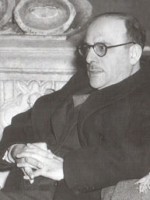Ivor Novello is a Actor, Scriptwriter, Producer and Music British born on 15 january 1893 at Cardiff (United-kingdom)
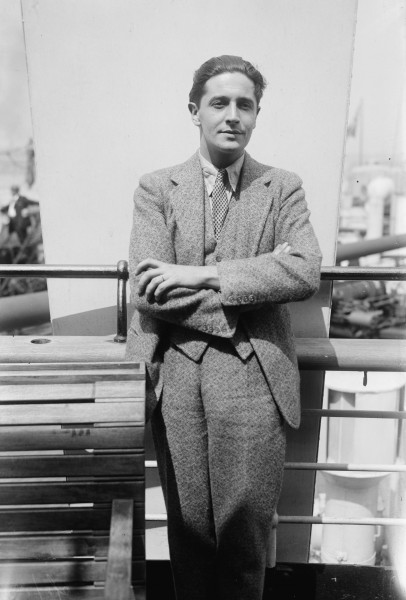
David Ivor Davies (15 January 1893 – 6 March 1951), better known as Ivor Novello, was a Welsh composer and actor who became one of the most popular British entertainers of the first half of the 20th century.
He was born into a musical family and his first successes were as a songwriter. His first big hit was "Keep the Home Fires Burning", which was enormously popular during the First World War. His 1917 show, Theodore & Co, was a wartime hit. After the war, Novello contributed numbers to several successful musical comedies and was eventually commissioned to write the scores of complete shows. He wrote his musicals in the style of operetta and often composed his music to the librettos of Christopher Hassall.
In the 1920s, he turned to acting, first in British films and then on stage, with considerable success in both. He starred in two silent films directed by Alfred Hitchcock, The Lodger and Downhill, both in 1927. On stage, he played the title character in the first London production of Liliom (1926). Novello briefly went to Hollywood, but he soon returned to Britain where he had more successes, especially on stage, appearing in his own lavish West End productions of musicals. The best known of these were Glamorous Night (1935) and The Dancing Years (1939). From the 1930s, he often performed with Zena Dare, writing parts for her in his works. He continued to write for film, but he had his biggest late successes with stage musicals: Perchance to Dream (1945), King's Rhapsody (1949) and Gay's the Word (1951).
Novello was born in Cardiff, Wales, to David Davies (c. 1852 — 1931), a rent collector for the city council, and his wife, Clara Novello Davies, an internationally-known singing teacher and choral conductor. As a boy, Novello was a successful singer in the Welsh Eisteddfod. His mother set up as voice teacher in London, where he met leading performers, including members of George Edwardes's Gaiety Theatre company, classical musicians such as Landon Ronald, and singers such as Adelina Patti. Another of his mother's associates was Clara Butt, who taught him to sing "Abide with Me" when he was a boy of six.
Novello was educated privately in Cardiff and then in Gloucester, where he studied harmony and counterpoint with Herbert Brewer, the cathedral organist. From there he won a scholarship to Magdalen College School in Oxford, where he was a solo treble in the college choir. He later said that this prolonged youthful exposure to early sacred choral music had turned his tastes, in reaction, to lush romantic music. Although Brewer had told him he would not have a career in music, Novello from his early youth showed a facility for writing songs, and when he was only 15, one of his songs was published. After leaving school, he gave piano lessons in Cardiff, and then moved to London in 1913. He took a flat above the Strand Theatre, which became his London home for the rest of his life.
In London he found a mentor in Sir Edward Marsh, a well-known patron of the arts. Marsh encouraged him to compose and introduced him to people who could help his career. He adopted part of his mother's maiden name, "Novello" as his professional surname, although he did not change it legally until 1927.
In 1914, at the start of the First World War, Novello wrote "Keep the Home Fires Burning", a song that expressed the feelings of innumerable families sundered by World War I. Novello composed the music for the song to a lyric by the American Lena Guilbert-Ford, and it became a huge popular success, bringing Novello money and fame at the age of 21. In other respects, the war had less impact on Novello than on many young men of his age. He avoided active service until June 1916, when he reported to a Royal Naval Air Service (RNAS) training depot as a probationary flight sub-lieutenant. After twice crashing an aeroplane, and with the influence of Marsh, he was moved to the Air Ministry office in central London performing clerical duties for the duration of the war.
Composer and actor
Novello continued to write songs while serving in the RNAS. He had his first stage success with Theodore & Co in 1916, a production by George Grossmith, Jr. and Edward Laurillard with a score composed by Novello and the young Jerome Kern. In the same year, Novello contributed to André Charlot's revue See-Saw. In 1917 he wrote for another Grossmith and Laurillard production, the operette Arlette, for which he contributed additional numbers to an existing French score by Jane Vieu and Guy le Feuvre. In the same year, Marsh introduced him to the actor Bobbie Andrews, who became Novello's life partner. Andrews introduced Novello to the young Noël Coward. Coward, six years Novello's junior, was deeply envious of Novello's effortless glamour. He wrote, "I just felt suddenly conscious of the long way I had to go before I could break into the magic atmosphere in which he moved and breathed with such nonchalance".
In 1918 and after the war, Novello continued to write successfully for musical comedy and revue. The former included Who's Hooper? (1919), an adaptation of a Pinero play, with a book by Fred Thompson, lyrics by Clifford Grey, and music by Howard Talbot and Novello, and The Golden Moth by Thompson and P.G. Wodehouse (1921), for which Novello provided the entire score. For Charlot, he contributed numbers to the revues Tabs (1918), A to Z (1921) and Puppets (1924). For the second of these, his songs included one of his few well-known comedy numbers, "And her mother came too", with lyrics by Dion Titheradge, written for Jack Buchanan.
At the same time as his successes as a composer, Novello was making a career as an actor. With "a classic profile that gained him matinee idol status amongst the film-going public", he was sought out on the strength of a publicity photograph by the Swiss film director Louis Mercanton. Mercanton offered him a silent-film role as the romantic lead in The Call of the Blood (1920). In the same year, he made another film for Mercanton, Miarka. Novello made his first English film, Carnival, the following year.
Novello made his stage debut in 1921 in Deburau by Sacha Guitry with Robert Loraine, Madge Titheradge and Bobbie Andrews, and among other stage engagements, in the next years he played Bingley in an adaptation of Pride and Prejudice with Ben Webster as D'Arcy and Mary Jerrold as Elizabeth, in a cast that included Ellen Terry, May Whitty and Joyce Carey. At about this time, Novello had an affair with the writer Siegfried Sassoon; it was short lived, but in the words of Sassoon's biographer John Stuart Roberts, Novello "was a consummate flirt who collected lovers as he gathered lilacs."
In 1923, Novello made his American movie debut in D. W. Griffith's The White Rose. Back in England he co-wrote, produced and starred in the successful 1924 play The Rat. The play was made into a film in 1925, which was so successful that two sequels followed in 1926 and 1928. His dramatic roles in the West End included the title character in the first London production of Ferenc Molnár's Liliom (1926).
Other films in which Novello starred included Alfred Hitchcock's The Lodger (1926), where he played the sinister title character, and Downhill (1927). The British film company Gainsborough Pictures offered Novello a well-paid contract, which enabled him to buy a country house in Littlewick Green, near Maidenhead. He renamed the property Redroofs, and he entertained there famously and with little regard for convention. Cecil Beaton, noting the frequent homosexual excesses, coined the phrase, "the Ivor/Noel naughty set". Coward had by now caught Novello up professionally, despite a joint disaster when Novello starred in Coward's play Sirocco in 1927, which was a débâcle, and closed within a month of opening. In 1928 Novello starred in the silent adaptation of Coward's much more successful The Vortex, and made his last silent film, A South Sea Bubble. During the late 1920s, Novello was the most popular male star in British films.
Novello returned to composing for the lyric stage in 1929, writing eight numbers for the revue The House that Jack Built. In the same year, he presented his own play Symphony in Two Flats, which he took to New York the following year. It was followed by a successful Broadway production of his The Truth Game, which brought him to the attention of Hollywood studios. He accepted a contract to write for and appear in MGM films. He found little to do in Hollywood, however, beyond writing the dialogue for Tarzan the Ape Man. Returning to London, he starred in the sound remake of The Lodger (1932).
1930s musicals
After beginning the 1930s with a series of non-musical plays, I Lived With You (1932), Fresh Fields, Proscenium, Sunshine Sisters, Flies in the Sun (all 1933) and Murder in Mayfair (1934), Novello returned to composition in 1935 with Glamorous Night, which was the first of a series of enormously popular musicals. The Times considered that it was for these that Novello would be popularly remembered. Paul Webb, in the Grove Dictionary of Music and Musicians, writes that Novello's show saved the fortunes of the Theatre Royal, Drury Lane:
Dominating the British musical theatre from the mid-1930s to the early 1950s, his shows were heavily influenced by the operettas that he had grown up with (he saw Die lustige Witwe 27 times), but had a highly individual style of their own. Blending musicals with opera, operetta and both modern and classical dance, these shows were considered something of an anachronism in their own time, but that was part of their appeal.
Another model was Coward's 1929 musical Bitter Sweet, which Novello called "a lovely, lovely thing … sheer joy from beginning to end". That, too, was an old-fashioned musical, "so full of regret … for a vanished kindly silly darling age."
For all his four 1930s musicals, Novello wrote the book and music, Christopher Hassall wrote the lyrics, and the orchestrations were by Charles Prentice. Glamorous Night starred Novello and Mary Ellis, with a cast including Zena Dare, Olive Gilbert and Elizabeth Welch, and ran from 2 May 1935 to 18 July 1936, at Drury Lane and then the London Coliseum. Careless Rapture ran from 11 September 1936 for 296 performances, with Novello, Dorothy Dickson and Zena Dare in the leading roles. Crest of the Wave starred Novello, Dickson and Gilbert, and ran from 1 September 1937 for 203 performances. The last of Novello's pre-war musicals was The Dancing Years, which starred Novello, Ellis and Gilbert, opened at Drury Lane, closed on the outbreak of the Second World War, and re-opened at the Adelphi Theatre, running for a combined total of 696 performances, closing on 8 July 1944. This show was the closest Novello came to fulfilling his mother's early ambitions for him to write operas; he played an Austrian composer-conductor at the Wiener Hofoper.
Second World War and last years
Novello presented only two new shows during the war. Arc de Triomphe (1943), a musical vehicle for Mary Ellis, was only a modest success, but Perchance to Dream (1945) was immensely successful, running for 1,022 performances. In between the two shows, Novello had been in serious legal trouble and served four weeks in prison for misuse of petrol coupons, a serious offence under rationing laws in wartime Britain. An admiring fan had stolen the coupons from her employer, but the court found that Novello was also culpable. The prison term, though short, came as a severe shock to Novello, both mentally and physically, and had serious lasting effects. Not everybody was supportive; Coward's sympathy was limited: "He's been fighting like a steer to keep going as before the war and hasn't done a thing for the general effort", but when Novello returned to The Dancing Years after his release, he received "a rapturous ovation" on his first entrance.
Novello's last full-scale production in this style, King's Rhapsody (1949), was, in Webb's words, "a selfconsciously romantic counter-blast to the modern musical: crown princes, ballrooms, royal yachts, beautiful princesses and a full-scale coronation". After the rigours of war, this escapist entertainment had strong box-office appeal, and ran for 841 performances. The show starred Novello and the cast included Phyllis Dare, Zena Dare, Olive Gilbert and Bobbie Andrews. It was still running, at the Palace Theatre, when Novello's last show opened. This was Gay's the Word (1951). Novello had written no role for himself; the show starred the comedy actress Cicely Courtneidge and was a departure from his established pattern, balancing the contrasting styles of European operetta and post-war American musicals. The Times commented that the show "cheerfully parodied the very Ruritanian romances to which he owed his most triumphant successes."
Novello died suddenly from a coronary thrombosis at the age of 58, a few hours after completing a performance in the run of King's Rhapsody. He was cremated at the Golders Green Crematorium, and his ashes are buried beneath a lilac bush and marked with a plaque that reads "Ivor Novello 6th March 1951 'Till you are home once more'." He left an estate worth £160,000. Only a few weeks before Novello's death, Coward had written of him: "Theatre – good, bad and indifferent – is the love of his life. For him, other human endeavours are mere shadows. … The reward of his work lies in the indisputable fact that whenever and wherever he appears the vast majority of the British public flock to see him." Grove's Dictionary of Music and Musicians writes of Novello that he was "until the advent of Andrew Lloyd Webber, the 20th-century's most consistently successful composer of British musicals."
Source : Wikidata
Ivor Novello

Birth name David Ivor Davies
Nationality United-kingdom
Birth 15 january 1893 at Cardiff (United-kingdom)
Death 6 march 1951 (at 58 years) at London (United-kingdom)
Nationality United-kingdom
Birth 15 january 1893 at Cardiff (United-kingdom)
Death 6 march 1951 (at 58 years) at London (United-kingdom)
David Ivor Davies (15 January 1893 – 6 March 1951), better known as Ivor Novello, was a Welsh composer and actor who became one of the most popular British entertainers of the first half of the 20th century.
He was born into a musical family and his first successes were as a songwriter. His first big hit was "Keep the Home Fires Burning", which was enormously popular during the First World War. His 1917 show, Theodore & Co, was a wartime hit. After the war, Novello contributed numbers to several successful musical comedies and was eventually commissioned to write the scores of complete shows. He wrote his musicals in the style of operetta and often composed his music to the librettos of Christopher Hassall.
In the 1920s, he turned to acting, first in British films and then on stage, with considerable success in both. He starred in two silent films directed by Alfred Hitchcock, The Lodger and Downhill, both in 1927. On stage, he played the title character in the first London production of Liliom (1926). Novello briefly went to Hollywood, but he soon returned to Britain where he had more successes, especially on stage, appearing in his own lavish West End productions of musicals. The best known of these were Glamorous Night (1935) and The Dancing Years (1939). From the 1930s, he often performed with Zena Dare, writing parts for her in his works. He continued to write for film, but he had his biggest late successes with stage musicals: Perchance to Dream (1945), King's Rhapsody (1949) and Gay's the Word (1951).
Biography
Early yearsNovello was born in Cardiff, Wales, to David Davies (c. 1852 — 1931), a rent collector for the city council, and his wife, Clara Novello Davies, an internationally-known singing teacher and choral conductor. As a boy, Novello was a successful singer in the Welsh Eisteddfod. His mother set up as voice teacher in London, where he met leading performers, including members of George Edwardes's Gaiety Theatre company, classical musicians such as Landon Ronald, and singers such as Adelina Patti. Another of his mother's associates was Clara Butt, who taught him to sing "Abide with Me" when he was a boy of six.
Novello was educated privately in Cardiff and then in Gloucester, where he studied harmony and counterpoint with Herbert Brewer, the cathedral organist. From there he won a scholarship to Magdalen College School in Oxford, where he was a solo treble in the college choir. He later said that this prolonged youthful exposure to early sacred choral music had turned his tastes, in reaction, to lush romantic music. Although Brewer had told him he would not have a career in music, Novello from his early youth showed a facility for writing songs, and when he was only 15, one of his songs was published. After leaving school, he gave piano lessons in Cardiff, and then moved to London in 1913. He took a flat above the Strand Theatre, which became his London home for the rest of his life.
In London he found a mentor in Sir Edward Marsh, a well-known patron of the arts. Marsh encouraged him to compose and introduced him to people who could help his career. He adopted part of his mother's maiden name, "Novello" as his professional surname, although he did not change it legally until 1927.
In 1914, at the start of the First World War, Novello wrote "Keep the Home Fires Burning", a song that expressed the feelings of innumerable families sundered by World War I. Novello composed the music for the song to a lyric by the American Lena Guilbert-Ford, and it became a huge popular success, bringing Novello money and fame at the age of 21. In other respects, the war had less impact on Novello than on many young men of his age. He avoided active service until June 1916, when he reported to a Royal Naval Air Service (RNAS) training depot as a probationary flight sub-lieutenant. After twice crashing an aeroplane, and with the influence of Marsh, he was moved to the Air Ministry office in central London performing clerical duties for the duration of the war.
Composer and actor
Novello continued to write songs while serving in the RNAS. He had his first stage success with Theodore & Co in 1916, a production by George Grossmith, Jr. and Edward Laurillard with a score composed by Novello and the young Jerome Kern. In the same year, Novello contributed to André Charlot's revue See-Saw. In 1917 he wrote for another Grossmith and Laurillard production, the operette Arlette, for which he contributed additional numbers to an existing French score by Jane Vieu and Guy le Feuvre. In the same year, Marsh introduced him to the actor Bobbie Andrews, who became Novello's life partner. Andrews introduced Novello to the young Noël Coward. Coward, six years Novello's junior, was deeply envious of Novello's effortless glamour. He wrote, "I just felt suddenly conscious of the long way I had to go before I could break into the magic atmosphere in which he moved and breathed with such nonchalance".
In 1918 and after the war, Novello continued to write successfully for musical comedy and revue. The former included Who's Hooper? (1919), an adaptation of a Pinero play, with a book by Fred Thompson, lyrics by Clifford Grey, and music by Howard Talbot and Novello, and The Golden Moth by Thompson and P.G. Wodehouse (1921), for which Novello provided the entire score. For Charlot, he contributed numbers to the revues Tabs (1918), A to Z (1921) and Puppets (1924). For the second of these, his songs included one of his few well-known comedy numbers, "And her mother came too", with lyrics by Dion Titheradge, written for Jack Buchanan.
At the same time as his successes as a composer, Novello was making a career as an actor. With "a classic profile that gained him matinee idol status amongst the film-going public", he was sought out on the strength of a publicity photograph by the Swiss film director Louis Mercanton. Mercanton offered him a silent-film role as the romantic lead in The Call of the Blood (1920). In the same year, he made another film for Mercanton, Miarka. Novello made his first English film, Carnival, the following year.
Novello made his stage debut in 1921 in Deburau by Sacha Guitry with Robert Loraine, Madge Titheradge and Bobbie Andrews, and among other stage engagements, in the next years he played Bingley in an adaptation of Pride and Prejudice with Ben Webster as D'Arcy and Mary Jerrold as Elizabeth, in a cast that included Ellen Terry, May Whitty and Joyce Carey. At about this time, Novello had an affair with the writer Siegfried Sassoon; it was short lived, but in the words of Sassoon's biographer John Stuart Roberts, Novello "was a consummate flirt who collected lovers as he gathered lilacs."
In 1923, Novello made his American movie debut in D. W. Griffith's The White Rose. Back in England he co-wrote, produced and starred in the successful 1924 play The Rat. The play was made into a film in 1925, which was so successful that two sequels followed in 1926 and 1928. His dramatic roles in the West End included the title character in the first London production of Ferenc Molnár's Liliom (1926).
Other films in which Novello starred included Alfred Hitchcock's The Lodger (1926), where he played the sinister title character, and Downhill (1927). The British film company Gainsborough Pictures offered Novello a well-paid contract, which enabled him to buy a country house in Littlewick Green, near Maidenhead. He renamed the property Redroofs, and he entertained there famously and with little regard for convention. Cecil Beaton, noting the frequent homosexual excesses, coined the phrase, "the Ivor/Noel naughty set". Coward had by now caught Novello up professionally, despite a joint disaster when Novello starred in Coward's play Sirocco in 1927, which was a débâcle, and closed within a month of opening. In 1928 Novello starred in the silent adaptation of Coward's much more successful The Vortex, and made his last silent film, A South Sea Bubble. During the late 1920s, Novello was the most popular male star in British films.
Novello returned to composing for the lyric stage in 1929, writing eight numbers for the revue The House that Jack Built. In the same year, he presented his own play Symphony in Two Flats, which he took to New York the following year. It was followed by a successful Broadway production of his The Truth Game, which brought him to the attention of Hollywood studios. He accepted a contract to write for and appear in MGM films. He found little to do in Hollywood, however, beyond writing the dialogue for Tarzan the Ape Man. Returning to London, he starred in the sound remake of The Lodger (1932).
1930s musicals
After beginning the 1930s with a series of non-musical plays, I Lived With You (1932), Fresh Fields, Proscenium, Sunshine Sisters, Flies in the Sun (all 1933) and Murder in Mayfair (1934), Novello returned to composition in 1935 with Glamorous Night, which was the first of a series of enormously popular musicals. The Times considered that it was for these that Novello would be popularly remembered. Paul Webb, in the Grove Dictionary of Music and Musicians, writes that Novello's show saved the fortunes of the Theatre Royal, Drury Lane:
Dominating the British musical theatre from the mid-1930s to the early 1950s, his shows were heavily influenced by the operettas that he had grown up with (he saw Die lustige Witwe 27 times), but had a highly individual style of their own. Blending musicals with opera, operetta and both modern and classical dance, these shows were considered something of an anachronism in their own time, but that was part of their appeal.
Another model was Coward's 1929 musical Bitter Sweet, which Novello called "a lovely, lovely thing … sheer joy from beginning to end". That, too, was an old-fashioned musical, "so full of regret … for a vanished kindly silly darling age."
For all his four 1930s musicals, Novello wrote the book and music, Christopher Hassall wrote the lyrics, and the orchestrations were by Charles Prentice. Glamorous Night starred Novello and Mary Ellis, with a cast including Zena Dare, Olive Gilbert and Elizabeth Welch, and ran from 2 May 1935 to 18 July 1936, at Drury Lane and then the London Coliseum. Careless Rapture ran from 11 September 1936 for 296 performances, with Novello, Dorothy Dickson and Zena Dare in the leading roles. Crest of the Wave starred Novello, Dickson and Gilbert, and ran from 1 September 1937 for 203 performances. The last of Novello's pre-war musicals was The Dancing Years, which starred Novello, Ellis and Gilbert, opened at Drury Lane, closed on the outbreak of the Second World War, and re-opened at the Adelphi Theatre, running for a combined total of 696 performances, closing on 8 July 1944. This show was the closest Novello came to fulfilling his mother's early ambitions for him to write operas; he played an Austrian composer-conductor at the Wiener Hofoper.
Second World War and last years
Novello presented only two new shows during the war. Arc de Triomphe (1943), a musical vehicle for Mary Ellis, was only a modest success, but Perchance to Dream (1945) was immensely successful, running for 1,022 performances. In between the two shows, Novello had been in serious legal trouble and served four weeks in prison for misuse of petrol coupons, a serious offence under rationing laws in wartime Britain. An admiring fan had stolen the coupons from her employer, but the court found that Novello was also culpable. The prison term, though short, came as a severe shock to Novello, both mentally and physically, and had serious lasting effects. Not everybody was supportive; Coward's sympathy was limited: "He's been fighting like a steer to keep going as before the war and hasn't done a thing for the general effort", but when Novello returned to The Dancing Years after his release, he received "a rapturous ovation" on his first entrance.
Novello's last full-scale production in this style, King's Rhapsody (1949), was, in Webb's words, "a selfconsciously romantic counter-blast to the modern musical: crown princes, ballrooms, royal yachts, beautiful princesses and a full-scale coronation". After the rigours of war, this escapist entertainment had strong box-office appeal, and ran for 841 performances. The show starred Novello and the cast included Phyllis Dare, Zena Dare, Olive Gilbert and Bobbie Andrews. It was still running, at the Palace Theatre, when Novello's last show opened. This was Gay's the Word (1951). Novello had written no role for himself; the show starred the comedy actress Cicely Courtneidge and was a departure from his established pattern, balancing the contrasting styles of European operetta and post-war American musicals. The Times commented that the show "cheerfully parodied the very Ruritanian romances to which he owed his most triumphant successes."
Novello died suddenly from a coronary thrombosis at the age of 58, a few hours after completing a performance in the run of King's Rhapsody. He was cremated at the Golders Green Crematorium, and his ashes are buried beneath a lilac bush and marked with a plaque that reads "Ivor Novello 6th March 1951 'Till you are home once more'." He left an estate worth £160,000. Only a few weeks before Novello's death, Coward had written of him: "Theatre – good, bad and indifferent – is the love of his life. For him, other human endeavours are mere shadows. … The reward of his work lies in the indisputable fact that whenever and wherever he appears the vast majority of the British public flock to see him." Grove's Dictionary of Music and Musicians writes of Novello that he was "until the advent of Andrew Lloyd Webber, the 20th-century's most consistently successful composer of British musicals."
Usually with
Filmography of Ivor Novello (30 films)
Actor

Autumn Crocus (1934)
, 1h26Directed by Basil Dean
Origin United-kingdom
Genres Drama, Romance
Themes Films based on plays
Actors Ivor Novello, Fay Compton, Muriel Aked, Jack Hawkins, George Zucco, Pamela Blake
Roles Andreas Steiner
Rating71%






I Lived with You (1933)
, 1h35Directed by Maurice Elvey
Origin United-kingdom
Genres Comedy, Romance
Themes Films based on plays
Actors Ivor Novello, Ursula Jeans, Ida Lupino, Jack Hawkins, Minnie Rayner, Eliot Makeham
Roles Prince Felix Lenieff
Rating62%





A young cockney shop girl meets a penniless Russian prince and takes him home to live with her family. His presence creates chaos in the girls humble Fulham home. It turns out he has a secret cache of diamonds given him by the last Czar, and is persuaded to start selling them.
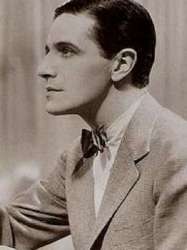
Sleeping Car (1933)
Directed by Anatole Litvak
Genres Comedy
Actors Madeleine Carroll, Ivor Novello, Kay Hammond, Claud Allister, Stanley Holloway, Ivor Barnard
Roles Gaston
Rating65%





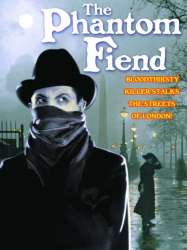
The Lodger (1932)
, 1h25Directed by Maurice Elvey
Origin United-kingdom
Genres Thriller, Action, Crime, Romance
Themes Serial killer films
Actors Ivor Novello, Elizabeth Allan, Peter Gawthorne, Barbara Everest, Jack Hawkins, Drusilla Wills
Roles Michel Angeloff
Rating56%






Once a Lady (1931)
, 1h20Directed by Guthrie McClintic
Origin USA
Genres Drama
Themes Films based on plays
Actors Ruth Chatterton, Ivor Novello, Jill Esmond, Geoffrey Kerr, Doris Lloyd, Herbert Bunston
Roles Bennett Cloud
Rating59%





A young Russian woman (Chatterton) marries a wealthy Englishman (Novello), and has a daughter with him. After she has an affair with one of his friends, she is forced to leave Britain and moves to Paris. Many years later, her daughter approaches her, needing her help.
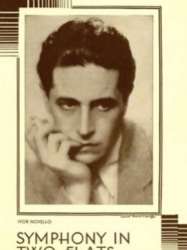
Symphony in Two Flats (1930)
Genres Drama
Actors Ivor Novello, Benita Hume, Jacqueline Logan, Cyril Ritchard, Minnie Rayner, Renee Clama
Roles David Kennard
Rating25%






The Return of the Rat (1929)
, 1h24Directed by Graham Cuts
Origin United-kingdom
Genres Drama, Crime, Romance
Actors Ivor Novello, Isabel Jeans, Mabel Poulton, Gordon Harker, Marie Ault, Bernard Nedell
Roles Pierre Boucheron
Rating65%





Pierre and Zélie are now married, but it is clear that the union has hit trouble. The latest manifestation of Zélie's restless, capricious nature is heavy gambling, to Pierre's disapproval. He nags her about her habit, but is ignored. Having tamed Pierre, Zélie now finds herself bored with him and starts to flirt openly with the wealthy Henri (Bernard Nedell). Her dismissive attitude towards Pierre, coupled with her continual desire to put him down and belittle him, finally causes him to leave her and return once again to his old haunt, the White Coffin Club.
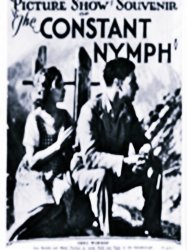
The Constant Nymph (1928)
, 1h50Directed by Adrian Brunel
Origin United-kingdom
Genres Drama, Romance
Themes Films about music and musicians
Actors Ivor Novello, Mabel Poulton, Mary Clare, Benita Hume, Dorothy Boyd, Clifford Heatherley
Roles Lewis Dodd
Rating73%





Young composer Lewis Dodd (Novello) travels to Austria to visit his mentor Albert Sanger (Georg Henrich). He meets Sanger's teenage daughters Tessa (Poulton), Antonia (Benita Hume), and Pauline (Dorothy Boyd) and Sanger's third wife Linda (Mary Clare), who does not appear to be liked by Sanger's daughters. The atmosphere is jovial and celebratory, until Sanger dies very suddenly.
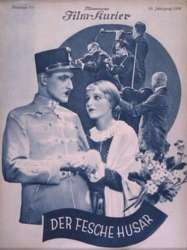
The Gallant Hussar (1928)
Directed by Géza von Bolváry
Origin German
Genres Comedy, Romance
Actors Ivor Novello, Evelyn Holt, Paul Hörbiger, Paul Otto, Ernő Verebes, Aribert Wäscher
Roles Lieutenant Stephen Alrik / Feri von Noszty
The daughter of an American millionaire falls in love with a Hungarian hussar officer during a visit to the Austrian Empire.

A South Sea Bubble (1928)
, 1h40Directed by T. Hayes Hunter
Origin United-kingdom
Genres Comedy, Adventure
Actors Ivor Novello, Benita Hume, Alma Taylor, John Hamilton, Stanley James Warmington, Harold Huth
Roles Vernon Winslow
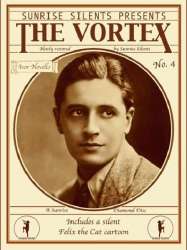
The Vortex (1928)
Directed by Adrian Brunel
Origin United-kingdom
Genres Drama
Actors Ivor Novello, Willette Kershaw, Kinsey Peile, Julie Suedo, Dorothy Fane
Roles Nicky Lancaster
Rating67%





 , 1h15
, 1h15Directed by Alfred Hitchcock, Alma Reville
Origin United-kingdom
Genres Drama, Thriller, Crime
Themes Serial killer films
Actors Marie Ault, Arthur Chesney, Ivor Novello, Reginald Gardiner, Eve Gray, Alfred Hitchcock
Roles The Lodger Jonathan Drew
Rating72%





The film begins with the screaming visage of a young blonde woman, framed against a sheet of glass, her golden hair illuminated. She is the seventh victim of a serial killer known as "The Avenger", who targets young blonde women on Tuesday evenings.

Downhill (1927)
, 1h20Directed by Alfred Hitchcock
Origin United-kingdom
Genres Drama, Thriller, Adventure
Themes Films about sexuality, Erotic films, Films about prostitution, Films based on plays, Erotic thriller films
Actors Ivor Novello, Isabel Jeans, Ian Hunter, Violet Farebrother, Norman McKinnel, Ben Webster
Roles Roddy Berwick
Rating59%





At an expensive English boarding school for boys, Roddy Berwick (Ivor Novello) is School Captain and star rugby player. He and his best friend Tim (Robin Irvine) start seeing a waitress Mabel (Annette Benson). Out of pique, she tells the headmaster that she is pregnant and that Roddy is the father. In fact it was Tim, who cannot afford to be expelled because he needs to win a scholarship to attend Oxford University. Promising Tim that he will never reveal the truth, Roddy accepts expulsion.

The Triumph of the Rat (1926)
, 1h14Directed by Graham Cuts
Origin United-kingdom
Genres Drama, Romance
Actors Ivor Novello, Isabel Jeans, Marie Ault, Julie Suedo, Gabriel Rosca
Roles Pierre Boucheron, 'the Rat'
Rating60%





The film opens with Pierre comfortably ensconced as the kept man of his old sparring-partner Zélie, who has apparently made good on her previous claims that she could transform him from a criminal ruffian into a gentleman accepted by the upper echelons of Parisian society. While he appears to relish his new-found social status, Zélie attempts to keep him on a tight rein by constantly reminding him that just as she pulled him up from the gutter, so can she send him back there if he displeases her.
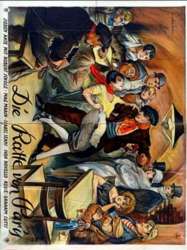
The Rat (1925)
, 1h14Directed by Graham Cuts
Origin United-kingdom
Genres Drama, Crime
Actors Mae Marsh, Ivor Novello, Isabel Jeans, Marie Ault, Julie Suedo
Roles Pierre Boucheron
Rating69%





Zélie de Chaumet (Jeans) is a bored, sensation-seeking demimondaine, living with her older lover and keeper Herman Stetz (Robert Scholtz) in a lavish apartment in a wealthy area of Paris. By contrast career criminal Pierre Boucheron (Novello), known as The Rat, lives with his casual girlfriend Odile (Marsh) in a run-down room in a squalid part of the city.
 Connection
Connection
